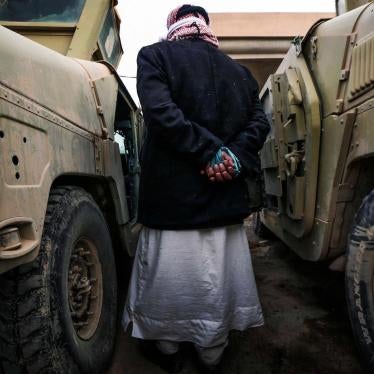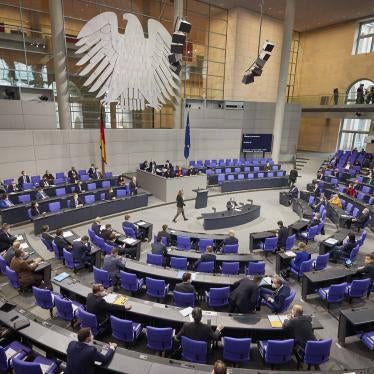This Friday, New York will host a ministerial gathering of Friends of Yemen, an international group formed to address political and economic conditions that have provided fertile ground for al Qaeda in the troubled Arab country. To be effective, it is critical that Friends not ignore Yemen's serious human rights abuses in their understandable eagerness to confront the terrorist threat within its borders.
The work of Friends--which include key western and Gulf states such as the US, the UK and Saudi Arabia--acquires greater urgency as the Obama administration contemplates a $1.2 billion increase in counterterrorism aid to Yemen and possible CIA drone strikes against suspected militants. Unless the US and Friends condition military and economic assistance on human rights improvements, they risk alienating Yemenis who might view such support as condoning abuses.
Friends of Yemen was formed in response to the attempted Christmas Day attack on a US airliner by a Nigerian student who was allegedly trained by Yemen's al Qaeda branch. Since that bombing attempt, Yemeni President Ali Abdullah Saleh has increased efforts to rout al Qaeda. The president in February also reached a ceasefire with northern Huthi rebels following years of conflict that greatly harmed the civilian population. He also has offered to conduct peace talks with a southern separatist movement.
Although the northern ceasefire generally holds, confrontations between government forces and southern separatists have grown increasingly violent. Meanwhile, credible reports persist of the arbitrary arrest, unlawful detention, and ill-treatment of alleged rebels, separatists and terrorists. In addition, the Saleh government has continued an intimidation campaign it launched last year against journalists and political dissidents. The tone of this campaign was set in January, when, within days of President Barack Obama's expressions of support for President Saleh, Yemeni security forces opened fire on hundreds of protestors peacefully demanding the reopening of the country's largest independent newspaper, Al-Ayyam.
Yemen's intelligence and security forces appear to have rounded up many critics under the guise of counterterrorism operations. In August for example, government counterterrorism forces arrested a journalist who reports on security issues and a cartoonist friend and held them incommunicado for 20 days. The journalist, Abd al-Ilah al-Shayi' of the official Saba news agency, appeared bruised at his first court hearing a month after his arrest and said government forces had beaten him.
Prosecutors cited evidence that al-Shayi' had interviewed al Qaeda members and sympathizers in accusing him of being a media propagandist for the group. Among those al-Shayi' had interviewed was Anwar al-Awlaki, a radical cleric whom the US has reportedly targeted for killing. By that standard, the well-known American journalist Peter Bergen, who interviewed Osama bin Laden for CNN in 1997, would also be behind bars. Prosecutors have offered no evidence against the cartoonist, Kamal Sharaf.
Some of President Saleh's counterterrorism efforts have caused civilian casualties and displaced tens of thousands of people in the south. This has angered local populations including southern separatists, even though many of them have a history of opposition to Islamic terrorism and are struggling against the Yemeni government, not the US. That in turn has generated sympathy between Islamist militants and some separatists that al Qaeda is exploiting.
For example, after a US-assisted missile strike last December against suspected al Qaeda camps in southern Abyan province killed at least 41 civilians, many of them women and children, some separatists denounced the strike as an attack on their movement.
Another US-assisted attack in central Marib province in May 2010 killed a deputy governor rather than the al Qaeda member who was targeted, prompting retaliation by the victim's tribe that included attacks on strategic pipelines.
Then, in August, the government launched a three-week shelling campaign against al Qaeda in Lawdar, a town in Abyan province that is also home to separatists. Media reports said most of the attack's three dozen victims were al Qaeda or security forces but it also damaged hundreds of homes and temporarily displaced tens of thousands of people. Then, earlier this week, the government attacked suspected al Qaeda members in the town of Hawta in southern Shabwa province, resulting in the displacement of thousands of families.
Southern movement leaders have issued statements equating the attacks in Lawdar and Hawta with attacks on all southerners. At a protest in the southern capital of Aden on Thursday, some southerners accused the government of targeting them under the pretext of fighting terrorism.
The US and its allies have called on President Saleh to respect human rights. But by participating in Yemeni counterterrorism measures while failing to take more concrete steps to end Saheh's repressive tactics, these countries fuel al Qaeda's narrative that they condone the Saleh government's abuses.
Already, many Yemenis fear their government more than they fear al Qaeda. And many say they are far more concerned about grinding poverty, massive unemployment and the country's depleting reserves of oil and water than they are about routing America's Most Wanted.
On Friday, the Friends of Yemen will discuss ways to help the country improve its economy and security, as well as foster good governance, justice and the rule of law. They should make this assistance contingent on President Saleh improving human rights. Friends also should press for accountability for violations by all sides in Yemen and push for the United Nations to establish a human rights monitoring and reporting mission in Yemen to help constrain abuses.
If they fail to take such steps, Friends risk galvanizing support in Yemen for the very forces they are trying to weaken.






